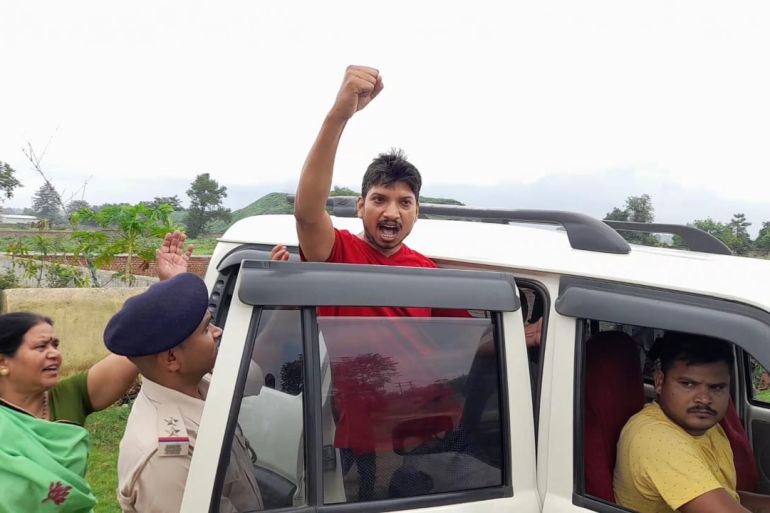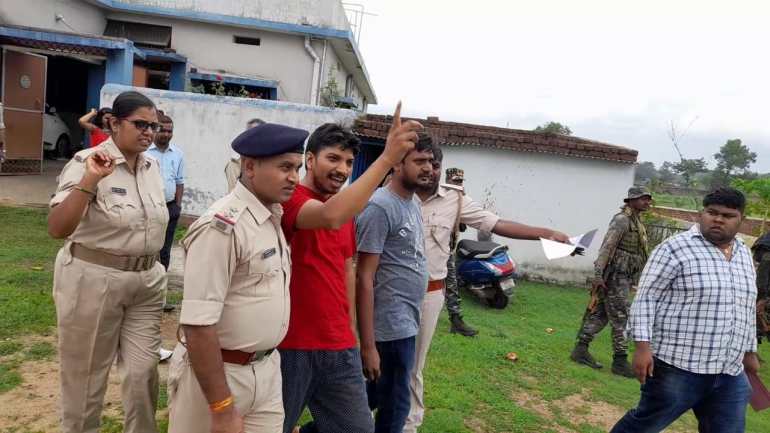Outrage as journalist arrested for alleged Maoist links in India
Rupesh Kumar Singh was arrested in Jharkhand state two days after he reported on industrial waste being dumped on tribal land.

New Delhi, India – The arrest of an independent journalist in eastern India’s Jharkhand state has raised concerns among his family members and rights activists who say he has been targeted for reporting on issues concerning the marginalised tribal community.
Rupesh Kumar Singh, 37, was arrested by the Jharkhand police on July 17 for alleged links with the Maoists, a banned left-wing armed group that has been waging a war against the Indian state for decades. The Maoists are mostly active in India’s tribal-dominated states.
Keep reading
list of 4 itemsIndian police charge 30 soldiers over killing of tribal people
Droupadi Murmu takes oath as India’s first tribal president
Translating India’s constitution into a tribal language
Singh, 37, was arrested after a 10-member police team from Jharkhand’s Saraikela Kharsawan district knocked at his home in Ramgarh town and conducted a nine-hour search, which his wife Ipsa Shatakshi described to Al Jazeera as “intense”.
Shatakshi said the police seized two mobile phones, a computer hard disk, documents and even a bed sheet during their search. She said they took away two laptops, including one that belonged to her sister.
The accounts teacher at a school in Ramgarh said she was surprised at the seizure of the bed sheet and the hard disk, which she said contained her lesson plans and videos of their five-year-old son.

Shatakshi said the police initially denied they were going to arrest her husband as they conducted their search. Only 10 minutes before the search ended, she said, the police showed them an arrest warrant which had charged Singh under the stringent Unlawful Activities Prevention Act (UAPA).
Shatakshi said she asked the local police officer about specific allegations against Singh. She was told the arrest was in connection with a first information report (FIR) under which some suspected Maoists were arrested. She also alleged Singh was not even named in the original FIR.
Al Jazeera called the district superintendent of police, Chandan Kumar Vats, to inquire about the allegations against Singh. “I can’t disclose this since the matter is under investigation and these details are yet not to be made available in public domain,” he replied.
Only two days before his arrest, Singh had reported on industrial waste being dumped on agricultural land belonging to the tribal community, turning it barren for sowing and adversely affecting the health of the people in a village in Giridih district of Jharkhand.
This report was published in Hindi portal, Janchowk, whose editor Mahendra Mishra believes Singh’s report became the trigger for his arrest.
“In Jharkhand, the ‘Adivasi’ (tribal) community is exploited by the corporates, their lands are taken away. Rupesh’s reporting in the interest of the ‘Adivasis’ directly harmed the corporates and that is why I believe his arrest was done on their behest,” Mishra told Al Jazeera.
Shatakshi also said reporters in Giridih had shared with Singh their fear of the local industrialists over reporting tribal issues.

Singh’s arrest has been criticised by left-wing political groups and activists in the region.
Vinod Kumar Singh, a legislator belonging to the Communist Party of India (Marxist-Leninist) raised the issue in the Jharkhand assembly and called for a “high-level investigation” into the arrest.
“Rupesh covers injustice against the Adivasi community which is largely ignored by the mainstream media. That’s why he is being targeted,” the politician from Bagodar constituency in Jharkhand told Al Jazeera.
The United States-based media watchdog Committee to Protect Journalists (CPJ) called for Singh’s immediate and unconditional release, and appealed to the Indian authorities to “cease harassing him in retaliation for his work, and allow him to report freely and safely”.
The Human Rights Defenders Alert (HRDA), a forum of rights activists, wrote to the National Human Rights Commission of India, flagging concerns over the police action against Singh. In its statement, it said there was no witness for 30 minutes during the search operation at his house and that there was a possibility of evidence being planted in the electronic devices seized from there.
The HRDA also alleged that Singh appeared before a court 27 hours after his arrest, in violation of the law.
This was not the first time Singh was arrested for his work. In June 2019, police in neighbouring Bihar state arrested him on various charges, including under the UAPA. Bihar police claimed they seized explosives and papers related with the Maoist organisation in his possession.
However, the police in Bihar failed to file a charge sheet even six months after his arrest. In December that year, a court in Gaya district granted him bail and observed that a lower court had extended Singh’s custody “in a mechanical way without application of judicial mind”.
“The fact that the police made big claims in the media but could not present even a charge sheet in the court is the biggest proof that Rupesh was targeted for reporting on the plight of the tribals and the arrest was meant to stop him from reporting,” said Shatakshi.
Shatakshi said she met her husband in jail last week where he told her the police have charged him with more cases, one of them being handled by the National Investigation Agency which probes terror-related crimes in India.
She said she sees the allegations as an attempt by the state to “frame Rupesh in multiple cases in order to prolong his detention”.
Singh also told Shatakshi he has been kept in an isolated and damaged unit with a leaking roof. He has requested that the jail administration transfer him to a safer place where he is allowed to meet other inmates, and that he be provided with a notebook and a pen. He said he will start a hunger strike if his demands inside the jail are not met.
Shatakshi said she is not getting any help from the state government headed by chief minister Hemant Soren over her husband’s arrest.
“When Hemant Soren was in opposition, he protested on the basis of Rupesh’s reporting, but now when he is the chief minister, he is not even responding to my emails concerning Rupesh’s safety in jail,” she told Al Jazeera.